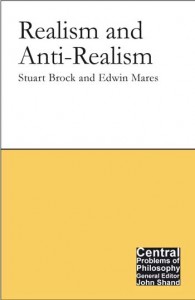 Whatnow? Realism? And Anti-Real-isms? Since this is the first time I’ve written about Realism and Anti-Realism, perhaps I should start with a brief explanation of what we (those bearding-twirling Philosophers and their bald counterparts) mean when we talk of objects being ‘real’ or not.
Whatnow? Realism? And Anti-Real-isms? Since this is the first time I’ve written about Realism and Anti-Realism, perhaps I should start with a brief explanation of what we (those bearding-twirling Philosophers and their bald counterparts) mean when we talk of objects being ‘real’ or not.
For one to be ‘realist’ about something is to say two things:
1) That something exists – i.e. it corresponds to the way things really are.
2) That something is ‘mind-independent‘ – i.e. it is not dependent on human beings.
Anti-Realism is non-acceptance of realism.
Ouinean Argument for minimal realism
For those in need of a little more technical argument for minimal realism, here is the Quinean argument given in ‘Realism and Anti-Realism’ (2007, Brock and Mares):
P1) We should believe that Fs exist if our accepted theories are ontologically committed to Fs.
P2) The theories we accept are ontologically committed to Fs.
C) Therefore we should believe that Fs exist.
Don’t be frightened by ‘ontological commitment’ – it just refers to what theories you accept (or more simply, the things you believe in). And as for ‘Fs’, that’s just a letter to substitute for whatever we wish to talk about. So for example, take gravity. Generally accepted theories of physics hold that there is such a force as gravity. Because we accept this theory, we should believe in gravity.
This is what we might call ‘minimal realism‘, because all we have determined is existence. The next step to to move to ‘robust realism‘ and show that F (or whatever we wish to talk about) exists independently of us (i.e. it doesn’t depend on our existence, our thinking about it or creating it – etc).
**********
Most of us would be realist about the objects we find around us in everyday life. We don’t want to deny that the sun exists, nor say that it is only shining because we are here to see and feel it. We intuitively think of it as real and its existence a fact, not dependent at all on our being able to perceive it.
Yet what can we say about more tricky matters? Think for a moment. Do prime numbers exist? Is murder wrong? Is the sky blue?
In the first question, we are talking about numbers. Are they real? They certainly aren’t to be found physically in the same way one can pluck an apple from a tree. Furthermore, are they mind-independent? Would numbers and mathematics exist if we did not? To clarify here, we are not interested in numerals – the words we use to refer to physical things – but the underlying mathematics that science attempts to show us the world is ordered by. Consider 3 trees in a line. Even if we didn’t exist (or simply just used a different symbol to represent the numeral 3), wouldn’t their still be 3 distinct trees? A tree in the centre, a tree to the left of that and to the right.
Next up, moral facts. Is murder wrong? Are we to believe there are such things as objective moral facts? Perhaps floating about in some special realm as Plato believed? Or, less extravagantly, moral facts required by and in some way created by our developed societies? How about the view that moral ‘facts’ are actually just our emotional responses? And after all that, what of opinion-independence? What’s right for me ought to be right for you, right? I’ll be delving into Moral Realism soon.
And colours. Again, we’re not concerned with colour words, but in objects in some sense ‘containing’ colours (or lack thereof). Does the sky contain a blueness (a property of blue)? Are we just subject to an illusion perhaps – colour is all in the mind? If not, how can we explain what a colour is and is it so independently of us?
**********
So when we are talking about realism and anti-realism, we are are attempting to shed some light on the existence of objects and also their relationship to us. (In philosophical talk: whether a sentence means what it appears to mean and whether or not it is true. If both of these things are true, one is committed to the existence of whatever the sentence is describing).
To contrast, epistemology is concerned with knowledge – what we know and how we know it. Can I be sure I’m not dreaming things? What if I’m being tricked in thinking something by an evil demon – etc.
Of course, the two have overlap.
**********
So then, with our primer over, let’s get stuck into those Unicorns, Cornish Pixies and Vampire ducks with fins and fur that go moo in the night. It’s onto Possible Worlds before a crash-landing in Morality.









One comment on “Realism vs. Anti-Realism – primer”